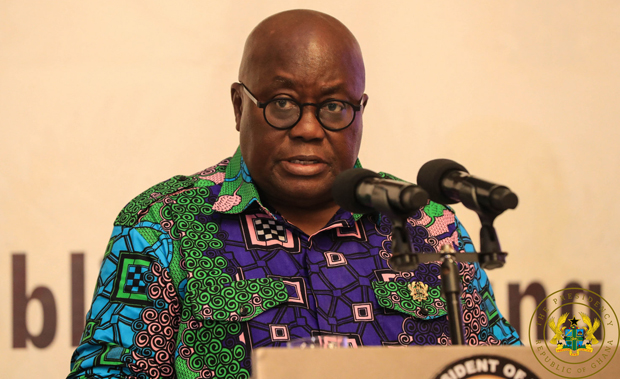President Akufo-Addo speaking at the launch of the Oil and Gas Licensing Round in Accra
President Akufo-Addo yesterday launched Ghana’s maiden oil and gas licensing round in line with the 2016 manifesto of the New Patriotic Party (NPP) to ensure transparency in the country’s oil and gas sector.
The licensing round, which is in accordance with the Petroleum Exploration and Product Act 2016 (Act 919), seeks to ensure transparency and fairness in the allocation of Ghana’s oil blocks.
It is also to ensure that the sector ministry selects companies that are capable of carrying out exploration in the most efficient and profitable manner.
In 2016, the NPP promised Ghanaians that it would improve transparency in the management of the country’s oil and gas resources if given the nod.
President Akufo-Addo said his administration has taken several measures since January 2017 to improve the exploration of oil and gas in the country and increase oil revenue for the state.
“It has been eleven years since Ghana made her historic discovery of oil and gas deposits, as a result of the bold and farsighted policies of the Kufuor-led NPP government.”
He added that “it’s this same spirit, present in the current NPP government that has led to the realisation of a number of successes in Ghana’s upstream petroleum sector since January 2017. Some of these include the establishment of a petroleum register launched earlier this year to allow the public access petroleum agreements, licences, permits and authorisations, with the view of enhancing transparency in the management of the petroleum upstream sector.”
The president also cited the launch of the Accelerated Oil and Gas Capacity (AOGC) Programme, which is empowering local firms to play progressively active roles in the oil and gas value chain through capacity development, financing and partnership support, passage of the Petroleum Exploration and Production (Data Management) Regulations 2017, LI 2257, the Petroleum Exploration and Production (Health, Safety and Environment) Regulations 2017, LI 2258 and the General Petroleum Regulations.
He stated that “there has been the “finalisation of the interconnection between the National Gas Transmission System and the West Africa Gas Pipeline system, and a 17% reduction of the delivered price of domestic gas from $8.8 to $7.29 per mmbtu in line with government’s strategy to position the gas industry as a leading contributor to value added industrialization in Ghana.”
Further Steps
According to the president, “In seeking to increase our reserves and improve on oil and gas production, Cabinet will soon approve a ‘Blueprint and Roadmap for Accelerated Oil and Gas Exploration and Development which is based on a new strategy of aggressive exploration.
The strategy, he disclosed, seeks to build synergies with the domestic downstream petroleum sector to increase Ghanaian participation in the oil industry and to accelerate the pace of institutional capacity development to manage the country’s oil and gas resources efficiently.
Job Creation
The president explained that the rapid growth of the Ghanaian economy and the creation of jobs are strongly linked to the success of the petroleum sector, among others.
Terminations
“To accelerate further exploration activity, I have charged the Ministry of Energy to review critically existing operations in the industry, with the view to determining oil fields that are sub-optimal,” he said
According to him, the review also covers Petroleum Agreements that are dormant.
“The Ministry of Energy will engage with the operators, after the review, on the adoption of best methods for increasing oil recovery rate. For Petroleum Agreements that are dormant, the Ministry will encourage the operators to consider inviting stronger partners to join them or risk the termination of these Petroleum Agreements, should they persist in failing to meet their minimum work obligations.”
There are currently six demarcated oil blocks in the Western Region, according to the Ministry of Energy.
Energy Minister, John Peter Amewu, said government has been working assiduously to make oil and gas sector the fastest-growing industry in Ghana.
He disclosed that out of the current 17 licences and 19 contract areas in the sector, 13 were issued between 2013 and 2016.
By Charles Takyi-Boadu & Melvin Tarlue


